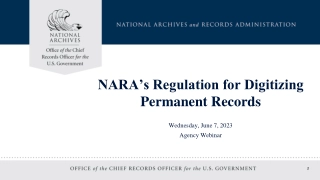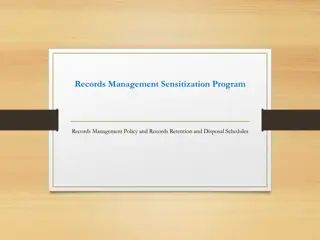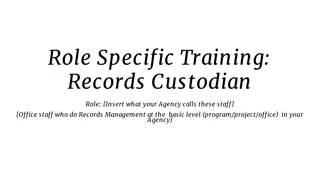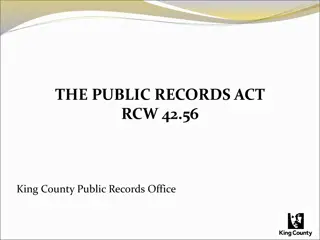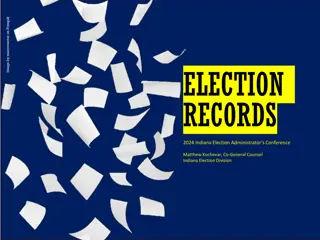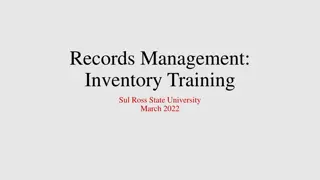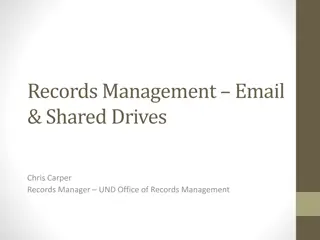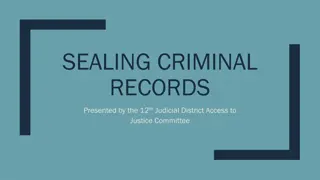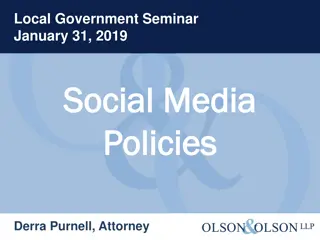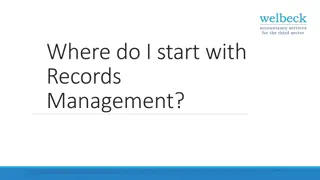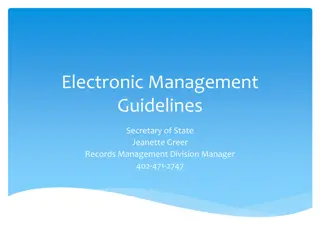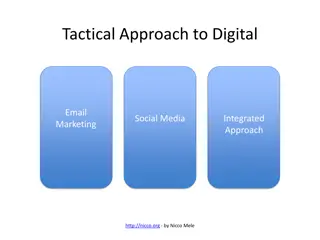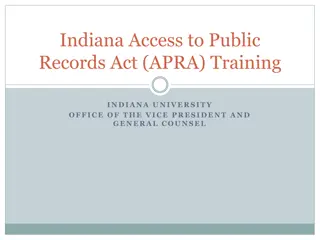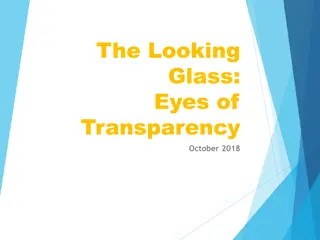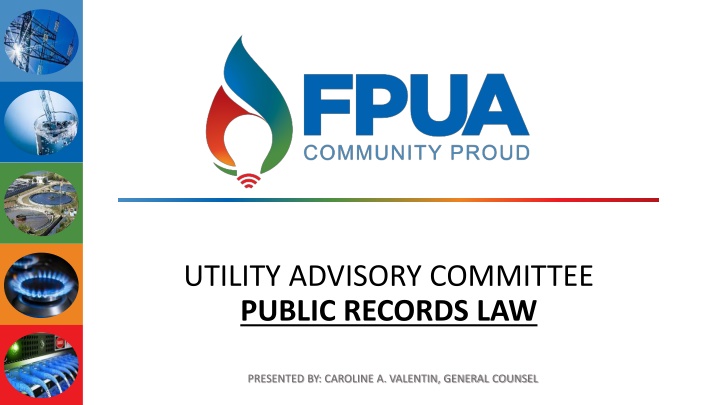
Florida's Public Records Law
Explore Florida's Public Records Law, which grants individuals the right to inspect or copy public records held by various government bodies. This law promotes transparency and accountability in state and local governance.
Download Presentation

Please find below an Image/Link to download the presentation.
The content on the website is provided AS IS for your information and personal use only. It may not be sold, licensed, or shared on other websites without obtaining consent from the author. If you encounter any issues during the download, it is possible that the publisher has removed the file from their server.
You are allowed to download the files provided on this website for personal or commercial use, subject to the condition that they are used lawfully. All files are the property of their respective owners.
The content on the website is provided AS IS for your information and personal use only. It may not be sold, licensed, or shared on other websites without obtaining consent from the author.
E N D
Presentation Transcript
UTILITY ADVISORY COMMITTEE PUBLIC RECORDS LAW PRESENTED BY: CAROLINE A. VALENTIN, GENERAL COUNSEL
PUBLIC RECORDS LAW Art. I, 24(a), Florida Constitution Every person has the right to inspect or copy any public record made or received in connection with the official business of any public body, officer, or employee of the state, or persons acting on their behalf, except with respect to records exempted pursuant to this section or specifically made confidential by this Constitution. This section specifically includes the legislative, executive, and judicial branches of government and each agency or department created thereunder; counties, municipalities, and districts; and each constitutional officer, board, and commission, or entity created pursuant to law or this Constitution. Ch. 119, Fla. Stat. It is the policy of this state that all state, county, and municipal records are open for personal inspection and copying by any person. Providing access to public records is a duty of each agency.
SCOPE OF THE PUBLIC RECORDS LAW Florida s Public Records Law, Ch. 119, F.S., provides a right of access to the records of the state and local governments as well as to private entities acting on their behalf. In the absence of a statutory exemption, this right of access applies to all materials made or received by an agency in connection with the transaction of official business which are used to perpetuate, communicate or formalize knowledge.
PUBLIC RECORDS DEFINED Section 119.011(12), F.S., defines public records to include: all documents, papers, letters, maps, books, tapes, photographs, films, sound recordings, data processing software, or other material, regardless of the physical form, characteristics, or means of transmission, made or received pursuant to law or ordinance or in connection with the transaction of official business by any agency.
MADE OR RECEIVED BY AN AGENCY any state, county, district, authority, or municipal officer, department, division, board, bureau, commission, or other separate unit of government created or established by law and any other public or private agency, person, partnership, corporation, or business entity acting on behalf of any public agency. Agency Defined
PRIVATE ENTITIES ACTING ON BEHALF OF AGENCY No clear criteria established by statute The mere act of contracting with, or receiving public funds from, a public agency is not sufficient to subject a private entity to Ch. 119 Includes private entities created by law or by a public agency Courts have relied on two tests: Totality of Factors Test Delegation of Function Test (e.g., jail operations, fire protection, employment search firm)
TRANSACTION OF OFFICIAL BUSINESS Records which are not made or received in connection with the transaction of official business do not constitute public records for purposes of Ch. 119 disclosure requirements. [T]he determining factor is the nature of the record, not its physical location. State v. City of Clearwater, 863 So. 2d 149, 154 (Fla. 2003). In Clearwater, the Court held that personal e-mails between government employees on government-owned computers which were not made or received in the course of official business did not constitute public records.
USED TO PERPETUATE, COMMUNICATE OR FORMALIZE KNOWLEDGE But see also Miami Herald Media Co. v. Sarnoff, 971 So. 2d 915 (Fla. 3d DCA 2007) (holding memo prepared by commissioner after meeting with former city official, summarizing details of conversation and containing alleged factual information about possible criminal activity, was a public record subject to disclosure. Court determined that the memorandum was not a draft or a note containing mental impressions that would later form a part of a government record, but rather formalized and perpetuated his final knowledge gained at the meeting.) See e.g., Inf. Op. to Trovato, June 2, 2009 (to the extent city commissioner has taken notes for his own personal use and such notes are not intended to perpetuate, communicate, or formalize knowledge, personal notes taken at a workshop or during a commission meeting would not be considered public records) Brief notes to yourself designed for personal use (to jog memory) & not shared (i.e., kept personal) not included.
STATUTORY EXEMPTIONS LEO and certain other Employee Addresses, Telephone Numbers, DOB Active Criminal Investigations Protected Health Information Bank Account Numbers Security Systems Information and Plans Customer Meter-Derived Data and Billing Information in Increments Less than One Billing Cycle (119.0713(5)(a), F.S. Bid responses (for a limited time) Social Security Numbers
PROVIDING PUBLIC RECORDS Requests can be made orally or in writing. Requester not required to explain the purpose or reason for request. Must be responded to in a reasonable time (amount of time required to retrieve record and delete exempt portions following determination of whether records exist, determining whether exemptions exist, and payment of any fees) Custodian of public records or designee must acknowledge requests to inspect or copy records promptly and respond to such requests in good faith. A good faith response includes making reasonable efforts to determine from other officers or employees within the agency whether such a record exists and, if so, the location at which the record can be accessed.
PROVIDING PUBLIC RECORDS Not required either to provide information from records or to create new records in response to a request. Not ordinarily required to reformat records and provide them in a particular form as demanded by the requestor, but an agency must provide a copy of the record in the medium requested if the agency maintains the record in that medium. Not required to respond to standing requests.
FEES Public information must be open for inspection without charge unless otherwise expressly provided by law. Section imposition of a special service charge when the nature or volume of public records to be inspected is such as to require extensive use of information technology resources, or extensive clerical or supervisory assistance, or both. The charge must be reasonable and based on the labor or computer costs actually incurred by the agency. 119.07(4)(d), F.S., authorizes the
REMEDIES AND PENALTIES A knowing or intentional violation is a 1st degree misdemeanor punishable by a fine of up to $1,000 and a jail term not to exceed one year. An unintentional violation is a non- criminal infraction, punishable by a fine up to $500 REMEDIES AND PENALTIES A public officer who intentionally violates the public records law is subject to suspension or removal from office. Attorney s fees and court costs are available to the requestor that prevails in a civil suit for access.
SOCIAL MEDIA CONSIDERATIONS Public Records Law Records Retention Sunshine Law First Amendment

